Fighting Infectious Diseases: A Healthcare Report for New Jersey
VerifiedAdded on 2022/10/06
|45
|10662
|16
Report
AI Summary
This report examines the issue of infectious diseases in New Jersey, focusing on outbreaks like adenovirus and Legionnaires', and their impact on the state's healthcare system. It delves into the causes of disease spread, including lack of healthcare staff and climate change, and reviews existing prevention strategies implemented by the New Jersey Department of Health. The report analyzes both primary and secondary data, including interviews with healthcare professionals and literature reviews, to identify effective strategies for eradicating infectious diseases. The study highlights the need for stricter healthcare policies, improved awareness, and more research to combat the growing threat of infectious diseases in the state. The findings include the impact of infectious diseases on the health of residents, the economy, and the education sector. The report concludes with recommendations for improved measures to prevent the spread of infectious diseases in New Jersey, along with limitations of the study.

Running head: HEALTHCARE
Healthcare
Name of the Student
Name of the University
Author Note
Healthcare
Name of the Student
Name of the University
Author Note
Paraphrase This Document
Need a fresh take? Get an instant paraphrase of this document with our AI Paraphraser
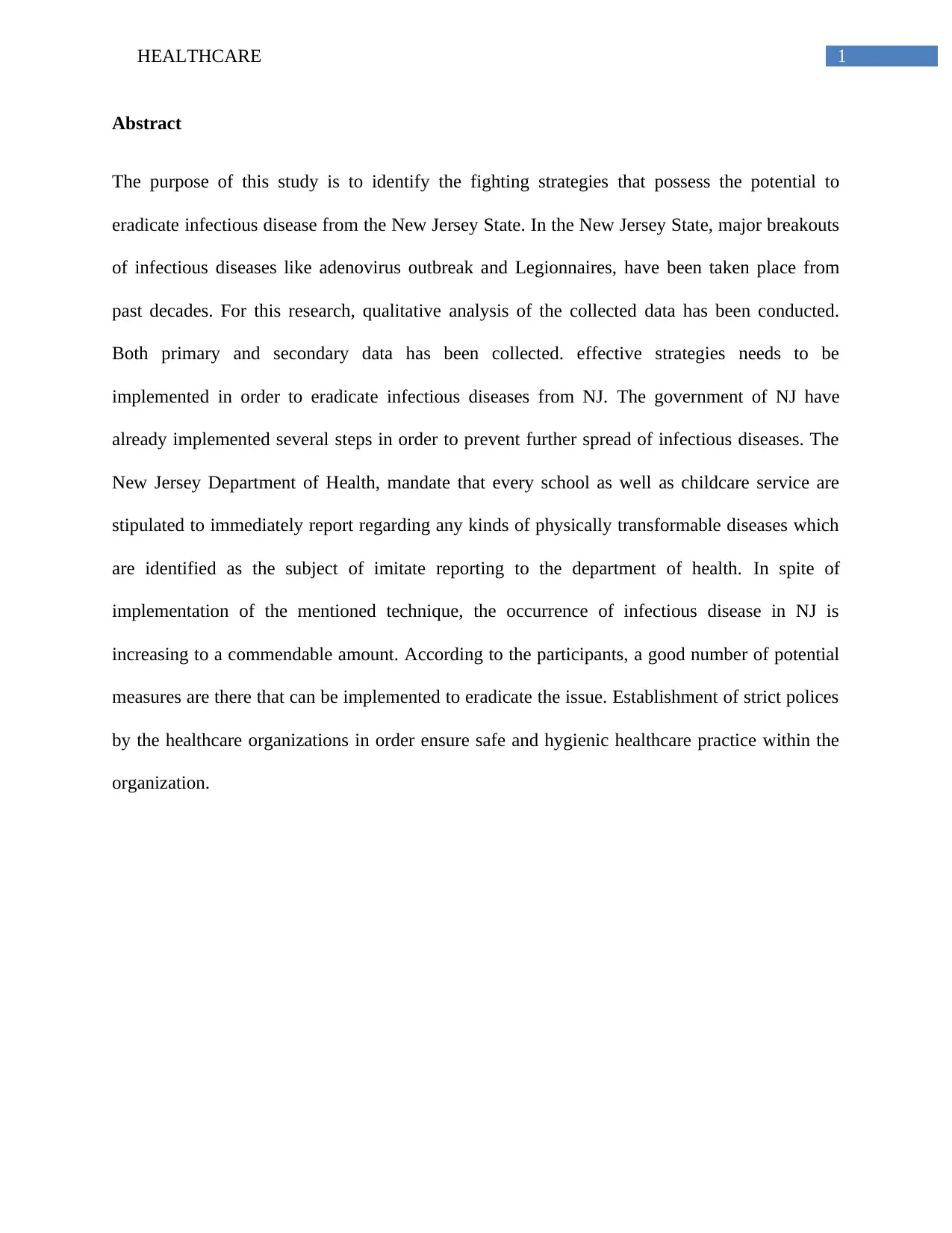
1HEALTHCARE
Abstract
The purpose of this study is to identify the fighting strategies that possess the potential to
eradicate infectious disease from the New Jersey State. In the New Jersey State, major breakouts
of infectious diseases like adenovirus outbreak and Legionnaires, have been taken place from
past decades. For this research, qualitative analysis of the collected data has been conducted.
Both primary and secondary data has been collected. effective strategies needs to be
implemented in order to eradicate infectious diseases from NJ. The government of NJ have
already implemented several steps in order to prevent further spread of infectious diseases. The
New Jersey Department of Health, mandate that every school as well as childcare service are
stipulated to immediately report regarding any kinds of physically transformable diseases which
are identified as the subject of imitate reporting to the department of health. In spite of
implementation of the mentioned technique, the occurrence of infectious disease in NJ is
increasing to a commendable amount. According to the participants, a good number of potential
measures are there that can be implemented to eradicate the issue. Establishment of strict polices
by the healthcare organizations in order ensure safe and hygienic healthcare practice within the
organization.
Abstract
The purpose of this study is to identify the fighting strategies that possess the potential to
eradicate infectious disease from the New Jersey State. In the New Jersey State, major breakouts
of infectious diseases like adenovirus outbreak and Legionnaires, have been taken place from
past decades. For this research, qualitative analysis of the collected data has been conducted.
Both primary and secondary data has been collected. effective strategies needs to be
implemented in order to eradicate infectious diseases from NJ. The government of NJ have
already implemented several steps in order to prevent further spread of infectious diseases. The
New Jersey Department of Health, mandate that every school as well as childcare service are
stipulated to immediately report regarding any kinds of physically transformable diseases which
are identified as the subject of imitate reporting to the department of health. In spite of
implementation of the mentioned technique, the occurrence of infectious disease in NJ is
increasing to a commendable amount. According to the participants, a good number of potential
measures are there that can be implemented to eradicate the issue. Establishment of strict polices
by the healthcare organizations in order ensure safe and hygienic healthcare practice within the
organization.
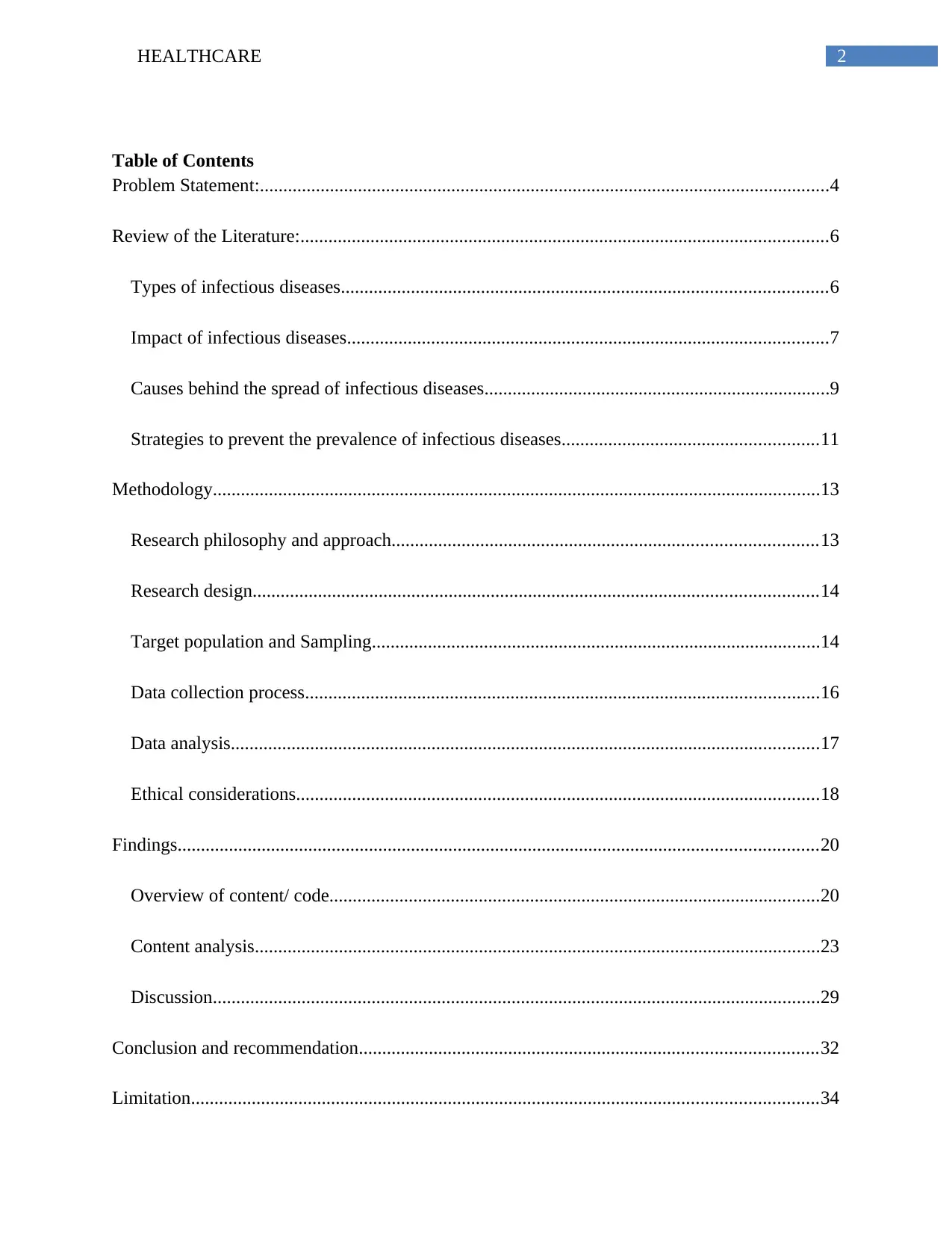
2HEALTHCARE
Table of Contents
Problem Statement:..........................................................................................................................4
Review of the Literature:.................................................................................................................6
Types of infectious diseases........................................................................................................6
Impact of infectious diseases.......................................................................................................7
Causes behind the spread of infectious diseases..........................................................................9
Strategies to prevent the prevalence of infectious diseases.......................................................11
Methodology..................................................................................................................................13
Research philosophy and approach...........................................................................................13
Research design.........................................................................................................................14
Target population and Sampling................................................................................................14
Data collection process..............................................................................................................16
Data analysis..............................................................................................................................17
Ethical considerations................................................................................................................18
Findings.........................................................................................................................................20
Overview of content/ code.........................................................................................................20
Content analysis.........................................................................................................................23
Discussion..................................................................................................................................29
Conclusion and recommendation..................................................................................................32
Limitation......................................................................................................................................34
Table of Contents
Problem Statement:..........................................................................................................................4
Review of the Literature:.................................................................................................................6
Types of infectious diseases........................................................................................................6
Impact of infectious diseases.......................................................................................................7
Causes behind the spread of infectious diseases..........................................................................9
Strategies to prevent the prevalence of infectious diseases.......................................................11
Methodology..................................................................................................................................13
Research philosophy and approach...........................................................................................13
Research design.........................................................................................................................14
Target population and Sampling................................................................................................14
Data collection process..............................................................................................................16
Data analysis..............................................................................................................................17
Ethical considerations................................................................................................................18
Findings.........................................................................................................................................20
Overview of content/ code.........................................................................................................20
Content analysis.........................................................................................................................23
Discussion..................................................................................................................................29
Conclusion and recommendation..................................................................................................32
Limitation......................................................................................................................................34
⊘ This is a preview!⊘
Do you want full access?
Subscribe today to unlock all pages.

Trusted by 1+ million students worldwide

3HEALTHCARE
Reference:......................................................................................................................................36
Reference:......................................................................................................................................36
Paraphrase This Document
Need a fresh take? Get an instant paraphrase of this document with our AI Paraphraser
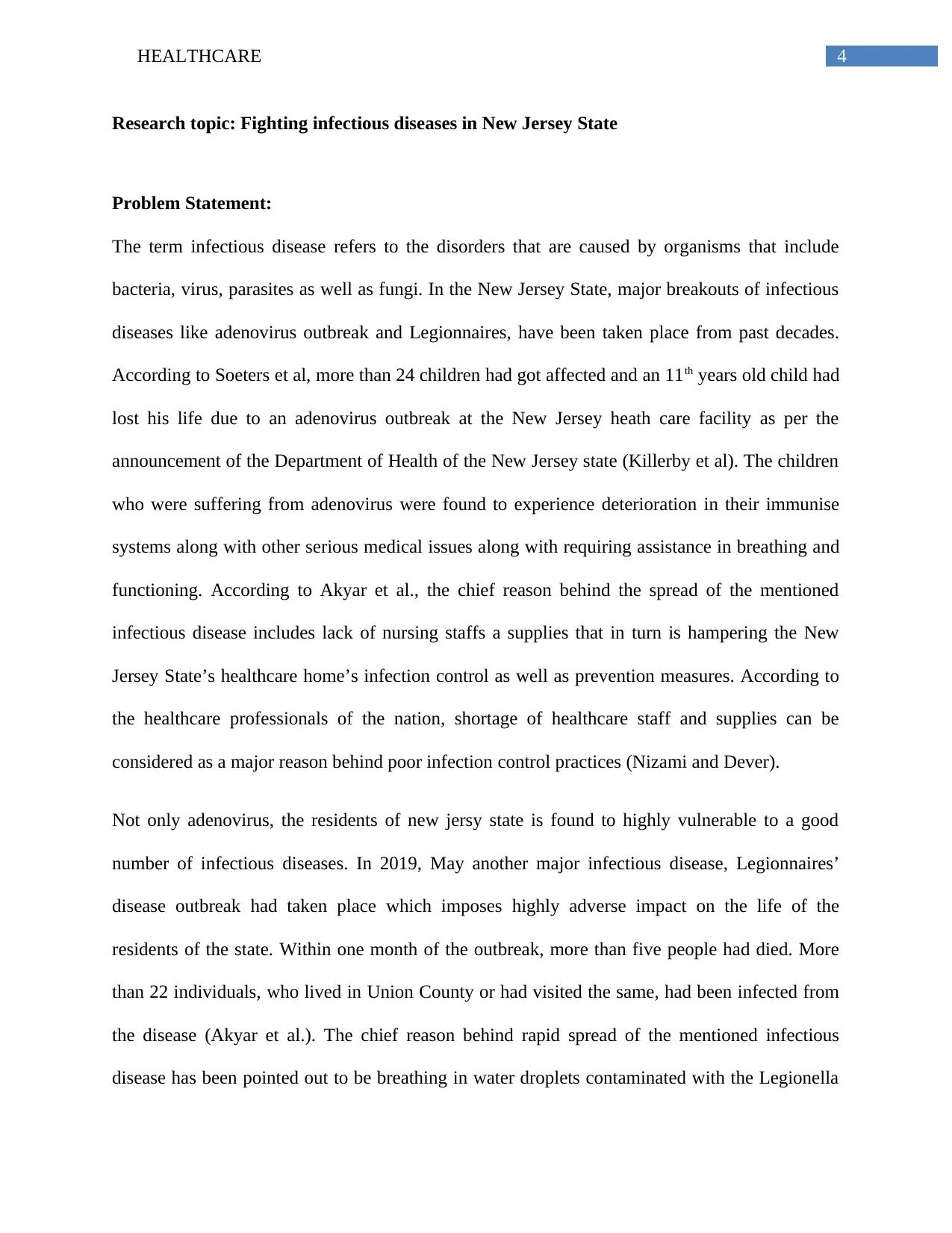
4HEALTHCARE
Research topic: Fighting infectious diseases in New Jersey State
Problem Statement:
The term infectious disease refers to the disorders that are caused by organisms that include
bacteria, virus, parasites as well as fungi. In the New Jersey State, major breakouts of infectious
diseases like adenovirus outbreak and Legionnaires, have been taken place from past decades.
According to Soeters et al, more than 24 children had got affected and an 11th years old child had
lost his life due to an adenovirus outbreak at the New Jersey heath care facility as per the
announcement of the Department of Health of the New Jersey state (Killerby et al). The children
who were suffering from adenovirus were found to experience deterioration in their immunise
systems along with other serious medical issues along with requiring assistance in breathing and
functioning. According to Akyar et al., the chief reason behind the spread of the mentioned
infectious disease includes lack of nursing staffs a supplies that in turn is hampering the New
Jersey State’s healthcare home’s infection control as well as prevention measures. According to
the healthcare professionals of the nation, shortage of healthcare staff and supplies can be
considered as a major reason behind poor infection control practices (Nizami and Dever).
Not only adenovirus, the residents of new jersy state is found to highly vulnerable to a good
number of infectious diseases. In 2019, May another major infectious disease, Legionnaires’
disease outbreak had taken place which imposes highly adverse impact on the life of the
residents of the state. Within one month of the outbreak, more than five people had died. More
than 22 individuals, who lived in Union County or had visited the same, had been infected from
the disease (Akyar et al.). The chief reason behind rapid spread of the mentioned infectious
disease has been pointed out to be breathing in water droplets contaminated with the Legionella
Research topic: Fighting infectious diseases in New Jersey State
Problem Statement:
The term infectious disease refers to the disorders that are caused by organisms that include
bacteria, virus, parasites as well as fungi. In the New Jersey State, major breakouts of infectious
diseases like adenovirus outbreak and Legionnaires, have been taken place from past decades.
According to Soeters et al, more than 24 children had got affected and an 11th years old child had
lost his life due to an adenovirus outbreak at the New Jersey heath care facility as per the
announcement of the Department of Health of the New Jersey state (Killerby et al). The children
who were suffering from adenovirus were found to experience deterioration in their immunise
systems along with other serious medical issues along with requiring assistance in breathing and
functioning. According to Akyar et al., the chief reason behind the spread of the mentioned
infectious disease includes lack of nursing staffs a supplies that in turn is hampering the New
Jersey State’s healthcare home’s infection control as well as prevention measures. According to
the healthcare professionals of the nation, shortage of healthcare staff and supplies can be
considered as a major reason behind poor infection control practices (Nizami and Dever).
Not only adenovirus, the residents of new jersy state is found to highly vulnerable to a good
number of infectious diseases. In 2019, May another major infectious disease, Legionnaires’
disease outbreak had taken place which imposes highly adverse impact on the life of the
residents of the state. Within one month of the outbreak, more than five people had died. More
than 22 individuals, who lived in Union County or had visited the same, had been infected from
the disease (Akyar et al.). The chief reason behind rapid spread of the mentioned infectious
disease has been pointed out to be breathing in water droplets contaminated with the Legionella
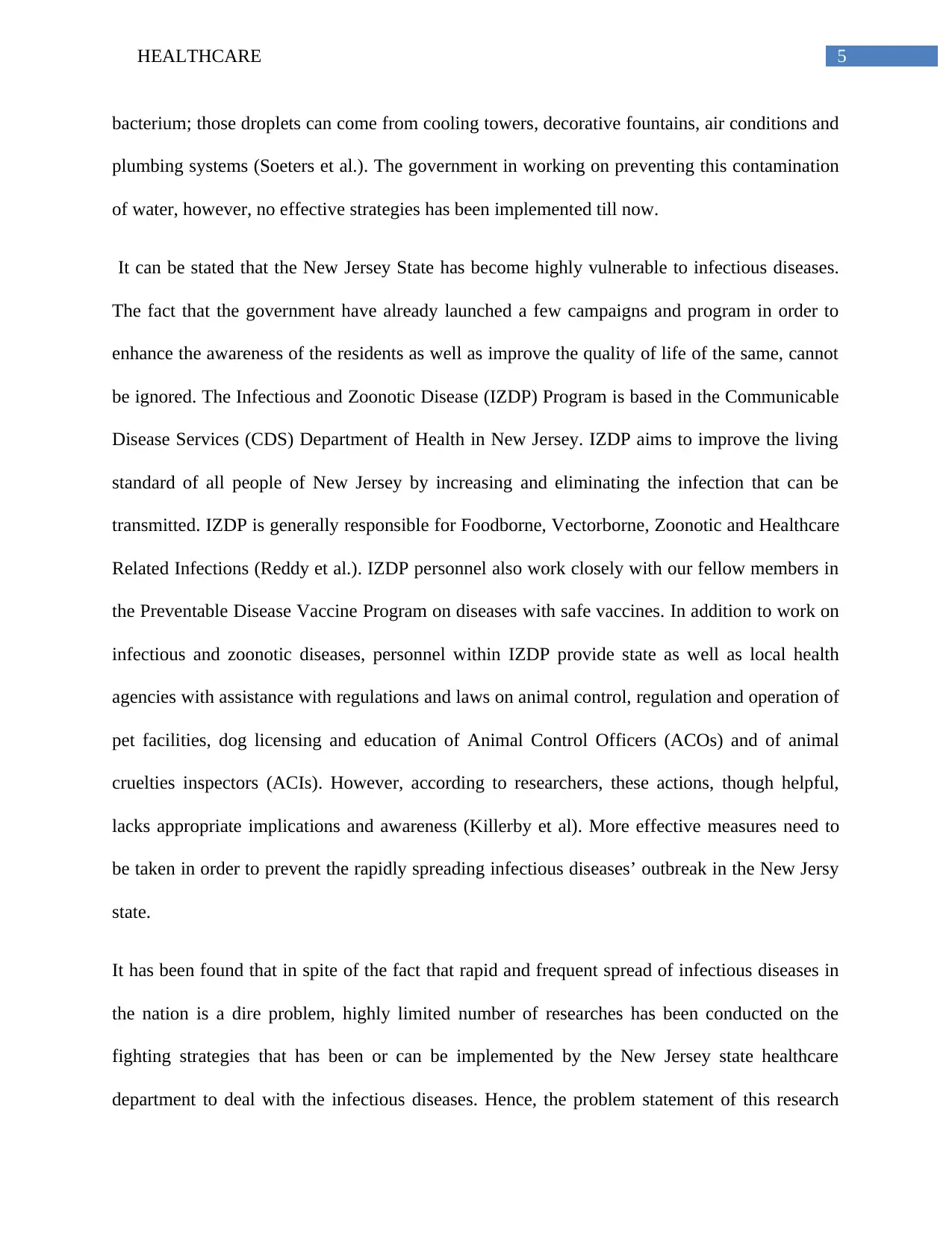
5HEALTHCARE
bacterium; those droplets can come from cooling towers, decorative fountains, air conditions and
plumbing systems (Soeters et al.). The government in working on preventing this contamination
of water, however, no effective strategies has been implemented till now.
It can be stated that the New Jersey State has become highly vulnerable to infectious diseases.
The fact that the government have already launched a few campaigns and program in order to
enhance the awareness of the residents as well as improve the quality of life of the same, cannot
be ignored. The Infectious and Zoonotic Disease (IZDP) Program is based in the Communicable
Disease Services (CDS) Department of Health in New Jersey. IZDP aims to improve the living
standard of all people of New Jersey by increasing and eliminating the infection that can be
transmitted. IZDP is generally responsible for Foodborne, Vectorborne, Zoonotic and Healthcare
Related Infections (Reddy et al.). IZDP personnel also work closely with our fellow members in
the Preventable Disease Vaccine Program on diseases with safe vaccines. In addition to work on
infectious and zoonotic diseases, personnel within IZDP provide state as well as local health
agencies with assistance with regulations and laws on animal control, regulation and operation of
pet facilities, dog licensing and education of Animal Control Officers (ACOs) and of animal
cruelties inspectors (ACIs). However, according to researchers, these actions, though helpful,
lacks appropriate implications and awareness (Killerby et al). More effective measures need to
be taken in order to prevent the rapidly spreading infectious diseases’ outbreak in the New Jersy
state.
It has been found that in spite of the fact that rapid and frequent spread of infectious diseases in
the nation is a dire problem, highly limited number of researches has been conducted on the
fighting strategies that has been or can be implemented by the New Jersey state healthcare
department to deal with the infectious diseases. Hence, the problem statement of this research
bacterium; those droplets can come from cooling towers, decorative fountains, air conditions and
plumbing systems (Soeters et al.). The government in working on preventing this contamination
of water, however, no effective strategies has been implemented till now.
It can be stated that the New Jersey State has become highly vulnerable to infectious diseases.
The fact that the government have already launched a few campaigns and program in order to
enhance the awareness of the residents as well as improve the quality of life of the same, cannot
be ignored. The Infectious and Zoonotic Disease (IZDP) Program is based in the Communicable
Disease Services (CDS) Department of Health in New Jersey. IZDP aims to improve the living
standard of all people of New Jersey by increasing and eliminating the infection that can be
transmitted. IZDP is generally responsible for Foodborne, Vectorborne, Zoonotic and Healthcare
Related Infections (Reddy et al.). IZDP personnel also work closely with our fellow members in
the Preventable Disease Vaccine Program on diseases with safe vaccines. In addition to work on
infectious and zoonotic diseases, personnel within IZDP provide state as well as local health
agencies with assistance with regulations and laws on animal control, regulation and operation of
pet facilities, dog licensing and education of Animal Control Officers (ACOs) and of animal
cruelties inspectors (ACIs). However, according to researchers, these actions, though helpful,
lacks appropriate implications and awareness (Killerby et al). More effective measures need to
be taken in order to prevent the rapidly spreading infectious diseases’ outbreak in the New Jersy
state.
It has been found that in spite of the fact that rapid and frequent spread of infectious diseases in
the nation is a dire problem, highly limited number of researches has been conducted on the
fighting strategies that has been or can be implemented by the New Jersey state healthcare
department to deal with the infectious diseases. Hence, the problem statement of this research
⊘ This is a preview!⊘
Do you want full access?
Subscribe today to unlock all pages.

Trusted by 1+ million students worldwide
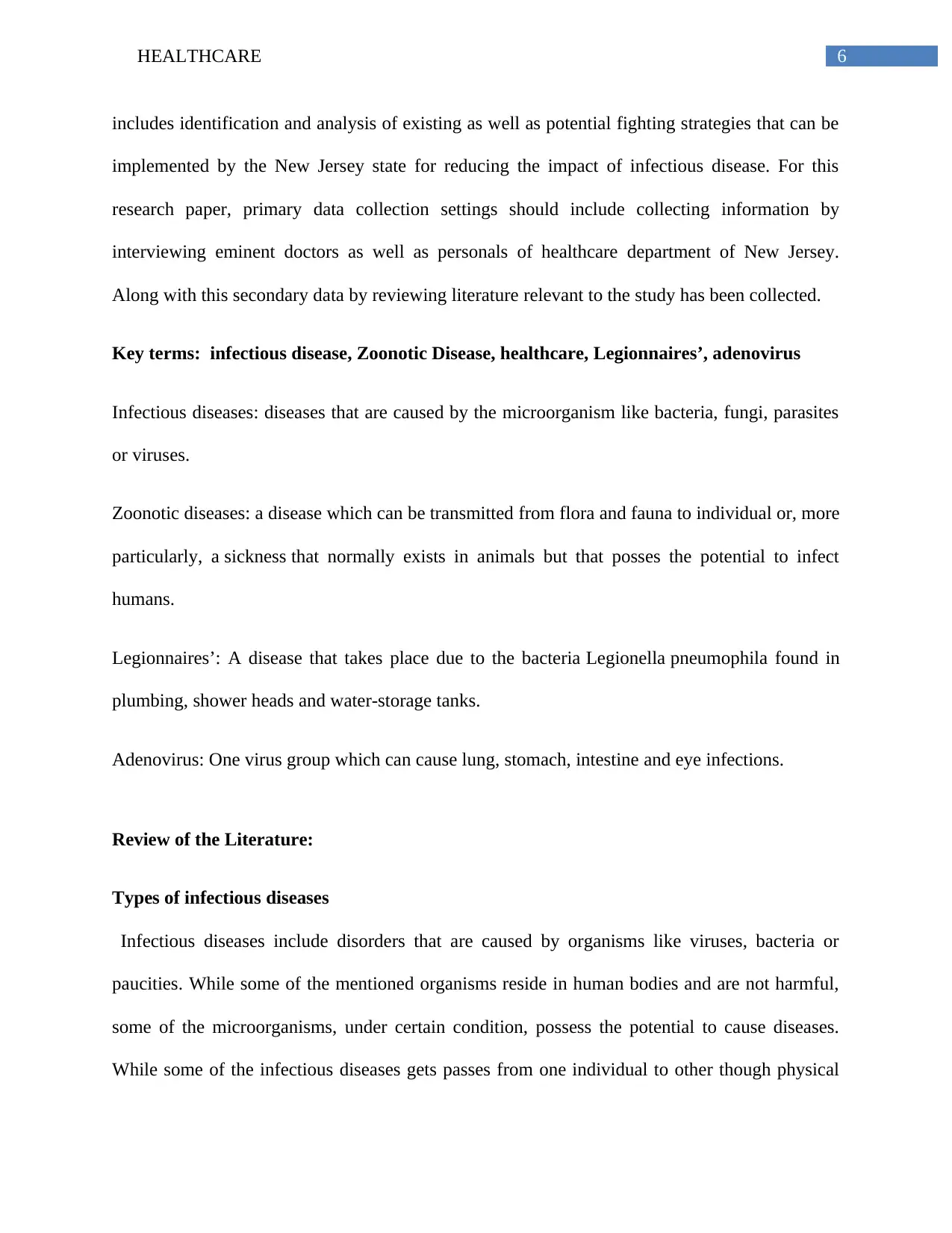
6HEALTHCARE
includes identification and analysis of existing as well as potential fighting strategies that can be
implemented by the New Jersey state for reducing the impact of infectious disease. For this
research paper, primary data collection settings should include collecting information by
interviewing eminent doctors as well as personals of healthcare department of New Jersey.
Along with this secondary data by reviewing literature relevant to the study has been collected.
Key terms: infectious disease, Zoonotic Disease, healthcare, Legionnaires’, adenovirus
Infectious diseases: diseases that are caused by the microorganism like bacteria, fungi, parasites
or viruses.
Zoonotic diseases: a disease which can be transmitted from flora and fauna to individual or, more
particularly, a sickness that normally exists in animals but that posses the potential to infect
humans.
Legionnaires’: A disease that takes place due to the bacteria Legionella pneumophila found in
plumbing, shower heads and water-storage tanks.
Adenovirus: One virus group which can cause lung, stomach, intestine and eye infections.
Review of the Literature:
Types of infectious diseases
Infectious diseases include disorders that are caused by organisms like viruses, bacteria or
paucities. While some of the mentioned organisms reside in human bodies and are not harmful,
some of the microorganisms, under certain condition, possess the potential to cause diseases.
While some of the infectious diseases gets passes from one individual to other though physical
includes identification and analysis of existing as well as potential fighting strategies that can be
implemented by the New Jersey state for reducing the impact of infectious disease. For this
research paper, primary data collection settings should include collecting information by
interviewing eminent doctors as well as personals of healthcare department of New Jersey.
Along with this secondary data by reviewing literature relevant to the study has been collected.
Key terms: infectious disease, Zoonotic Disease, healthcare, Legionnaires’, adenovirus
Infectious diseases: diseases that are caused by the microorganism like bacteria, fungi, parasites
or viruses.
Zoonotic diseases: a disease which can be transmitted from flora and fauna to individual or, more
particularly, a sickness that normally exists in animals but that posses the potential to infect
humans.
Legionnaires’: A disease that takes place due to the bacteria Legionella pneumophila found in
plumbing, shower heads and water-storage tanks.
Adenovirus: One virus group which can cause lung, stomach, intestine and eye infections.
Review of the Literature:
Types of infectious diseases
Infectious diseases include disorders that are caused by organisms like viruses, bacteria or
paucities. While some of the mentioned organisms reside in human bodies and are not harmful,
some of the microorganisms, under certain condition, possess the potential to cause diseases.
While some of the infectious diseases gets passes from one individual to other though physical
Paraphrase This Document
Need a fresh take? Get an instant paraphrase of this document with our AI Paraphraser
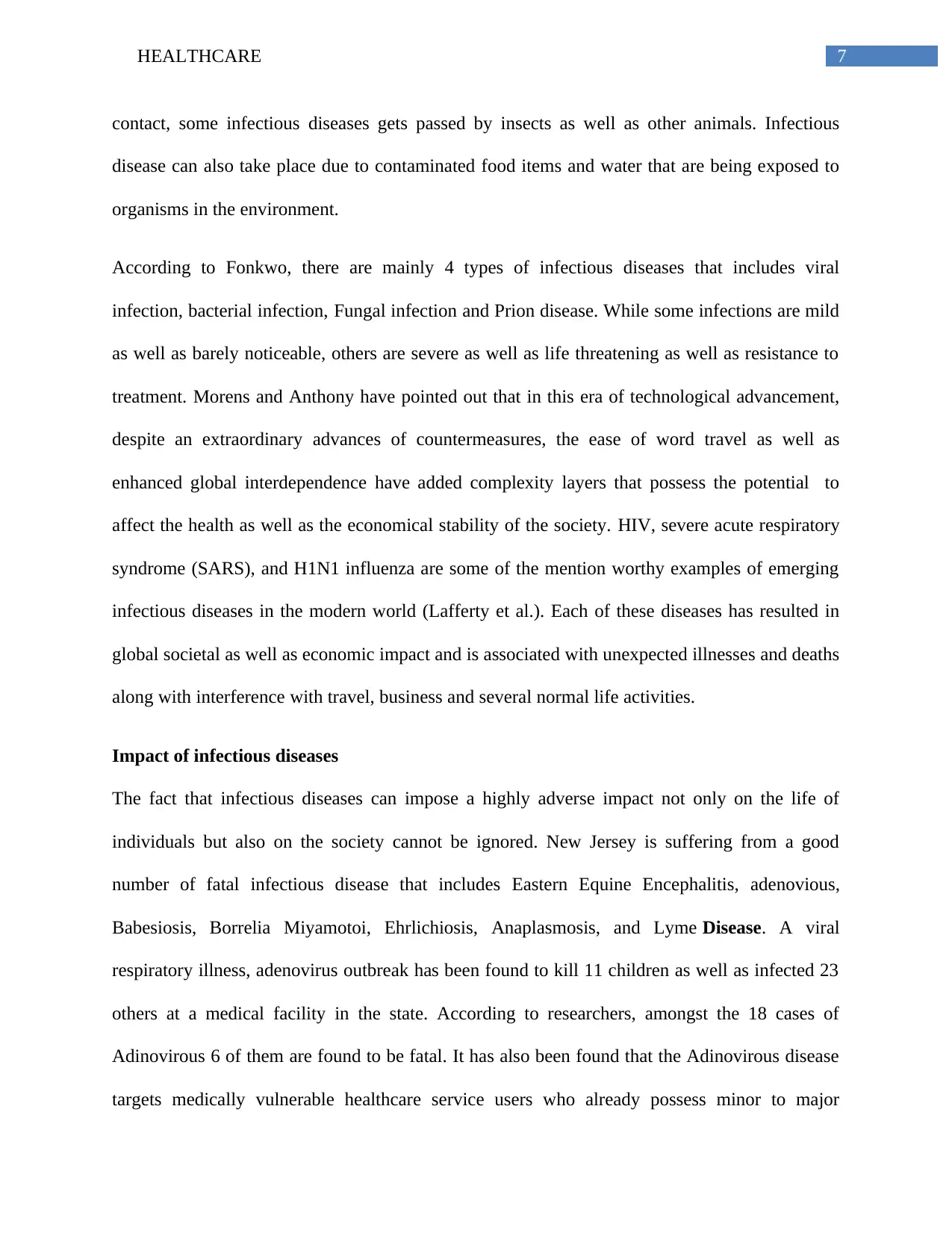
7HEALTHCARE
contact, some infectious diseases gets passed by insects as well as other animals. Infectious
disease can also take place due to contaminated food items and water that are being exposed to
organisms in the environment.
According to Fonkwo, there are mainly 4 types of infectious diseases that includes viral
infection, bacterial infection, Fungal infection and Prion disease. While some infections are mild
as well as barely noticeable, others are severe as well as life threatening as well as resistance to
treatment. Morens and Anthony have pointed out that in this era of technological advancement,
despite an extraordinary advances of countermeasures, the ease of word travel as well as
enhanced global interdependence have added complexity layers that possess the potential to
affect the health as well as the economical stability of the society. HIV, severe acute respiratory
syndrome (SARS), and H1N1 influenza are some of the mention worthy examples of emerging
infectious diseases in the modern world (Lafferty et al.). Each of these diseases has resulted in
global societal as well as economic impact and is associated with unexpected illnesses and deaths
along with interference with travel, business and several normal life activities.
Impact of infectious diseases
The fact that infectious diseases can impose a highly adverse impact not only on the life of
individuals but also on the society cannot be ignored. New Jersey is suffering from a good
number of fatal infectious disease that includes Eastern Equine Encephalitis, adenovious,
Babesiosis, Borrelia Miyamotoi, Ehrlichiosis, Anaplasmosis, and Lyme Disease. A viral
respiratory illness, adenovirus outbreak has been found to kill 11 children as well as infected 23
others at a medical facility in the state. According to researchers, amongst the 18 cases of
Adinovirous 6 of them are found to be fatal. It has also been found that the Adinovirous disease
targets medically vulnerable healthcare service users who already possess minor to major
contact, some infectious diseases gets passed by insects as well as other animals. Infectious
disease can also take place due to contaminated food items and water that are being exposed to
organisms in the environment.
According to Fonkwo, there are mainly 4 types of infectious diseases that includes viral
infection, bacterial infection, Fungal infection and Prion disease. While some infections are mild
as well as barely noticeable, others are severe as well as life threatening as well as resistance to
treatment. Morens and Anthony have pointed out that in this era of technological advancement,
despite an extraordinary advances of countermeasures, the ease of word travel as well as
enhanced global interdependence have added complexity layers that possess the potential to
affect the health as well as the economical stability of the society. HIV, severe acute respiratory
syndrome (SARS), and H1N1 influenza are some of the mention worthy examples of emerging
infectious diseases in the modern world (Lafferty et al.). Each of these diseases has resulted in
global societal as well as economic impact and is associated with unexpected illnesses and deaths
along with interference with travel, business and several normal life activities.
Impact of infectious diseases
The fact that infectious diseases can impose a highly adverse impact not only on the life of
individuals but also on the society cannot be ignored. New Jersey is suffering from a good
number of fatal infectious disease that includes Eastern Equine Encephalitis, adenovious,
Babesiosis, Borrelia Miyamotoi, Ehrlichiosis, Anaplasmosis, and Lyme Disease. A viral
respiratory illness, adenovirus outbreak has been found to kill 11 children as well as infected 23
others at a medical facility in the state. According to researchers, amongst the 18 cases of
Adinovirous 6 of them are found to be fatal. It has also been found that the Adinovirous disease
targets medically vulnerable healthcare service users who already possess minor to major
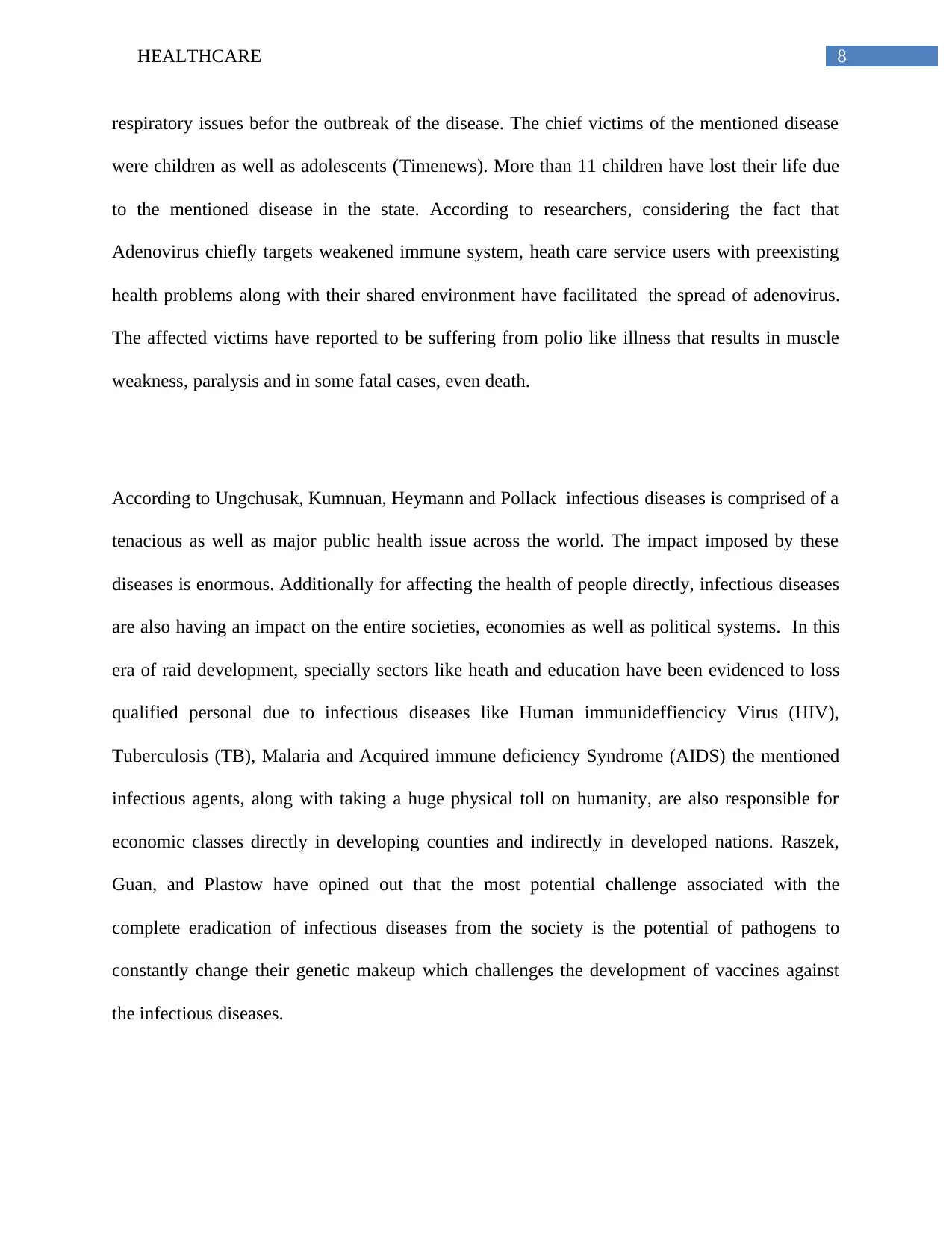
8HEALTHCARE
respiratory issues befor the outbreak of the disease. The chief victims of the mentioned disease
were children as well as adolescents (Timenews). More than 11 children have lost their life due
to the mentioned disease in the state. According to researchers, considering the fact that
Adenovirus chiefly targets weakened immune system, heath care service users with preexisting
health problems along with their shared environment have facilitated the spread of adenovirus.
The affected victims have reported to be suffering from polio like illness that results in muscle
weakness, paralysis and in some fatal cases, even death.
According to Ungchusak, Kumnuan, Heymann and Pollack infectious diseases is comprised of a
tenacious as well as major public health issue across the world. The impact imposed by these
diseases is enormous. Additionally for affecting the health of people directly, infectious diseases
are also having an impact on the entire societies, economies as well as political systems. In this
era of raid development, specially sectors like heath and education have been evidenced to loss
qualified personal due to infectious diseases like Human immunideffiencicy Virus (HIV),
Tuberculosis (TB), Malaria and Acquired immune deficiency Syndrome (AIDS) the mentioned
infectious agents, along with taking a huge physical toll on humanity, are also responsible for
economic classes directly in developing counties and indirectly in developed nations. Raszek,
Guan, and Plastow have opined out that the most potential challenge associated with the
complete eradication of infectious diseases from the society is the potential of pathogens to
constantly change their genetic makeup which challenges the development of vaccines against
the infectious diseases.
respiratory issues befor the outbreak of the disease. The chief victims of the mentioned disease
were children as well as adolescents (Timenews). More than 11 children have lost their life due
to the mentioned disease in the state. According to researchers, considering the fact that
Adenovirus chiefly targets weakened immune system, heath care service users with preexisting
health problems along with their shared environment have facilitated the spread of adenovirus.
The affected victims have reported to be suffering from polio like illness that results in muscle
weakness, paralysis and in some fatal cases, even death.
According to Ungchusak, Kumnuan, Heymann and Pollack infectious diseases is comprised of a
tenacious as well as major public health issue across the world. The impact imposed by these
diseases is enormous. Additionally for affecting the health of people directly, infectious diseases
are also having an impact on the entire societies, economies as well as political systems. In this
era of raid development, specially sectors like heath and education have been evidenced to loss
qualified personal due to infectious diseases like Human immunideffiencicy Virus (HIV),
Tuberculosis (TB), Malaria and Acquired immune deficiency Syndrome (AIDS) the mentioned
infectious agents, along with taking a huge physical toll on humanity, are also responsible for
economic classes directly in developing counties and indirectly in developed nations. Raszek,
Guan, and Plastow have opined out that the most potential challenge associated with the
complete eradication of infectious diseases from the society is the potential of pathogens to
constantly change their genetic makeup which challenges the development of vaccines against
the infectious diseases.
⊘ This is a preview!⊘
Do you want full access?
Subscribe today to unlock all pages.

Trusted by 1+ million students worldwide
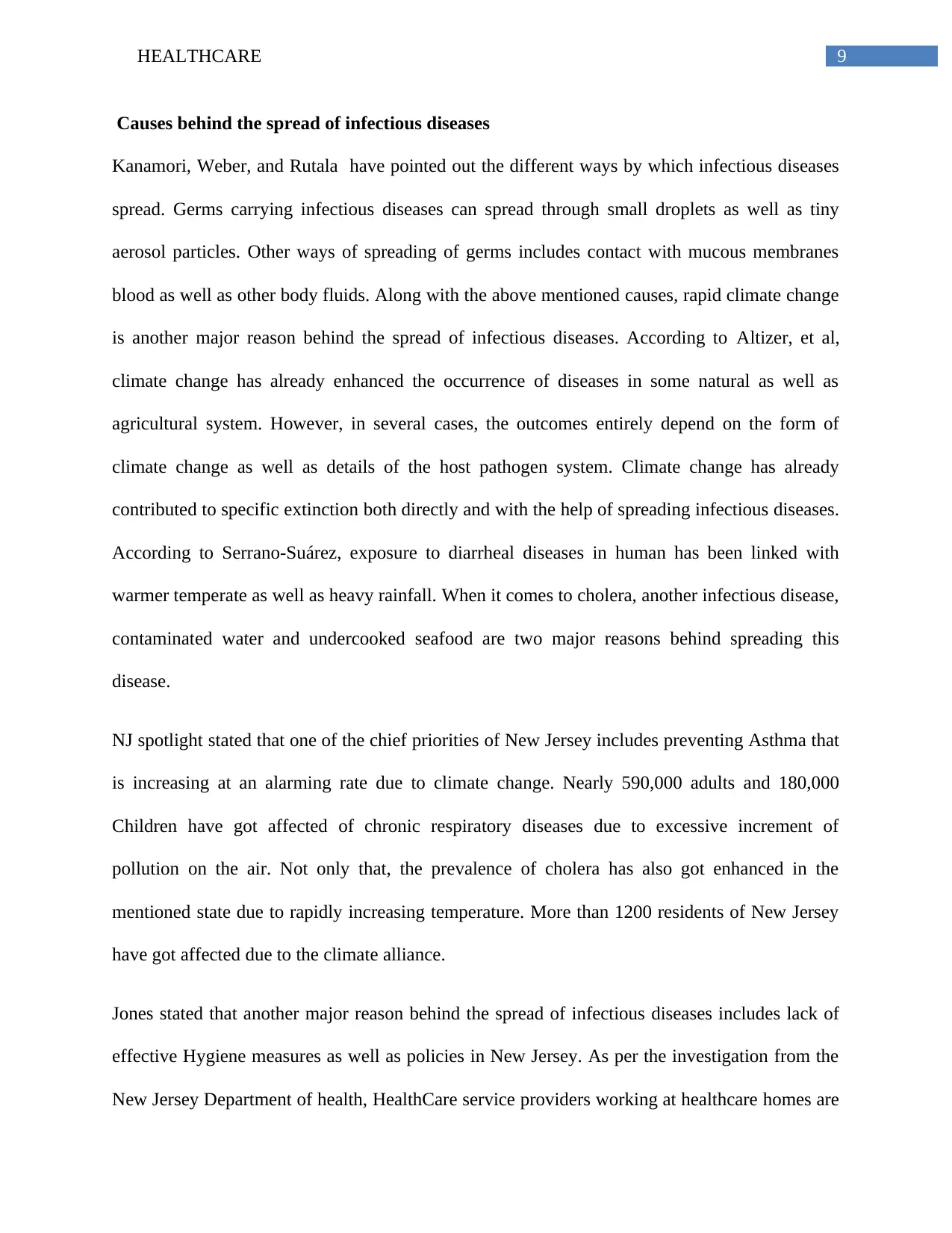
9HEALTHCARE
Causes behind the spread of infectious diseases
Kanamori, Weber, and Rutala have pointed out the different ways by which infectious diseases
spread. Germs carrying infectious diseases can spread through small droplets as well as tiny
aerosol particles. Other ways of spreading of germs includes contact with mucous membranes
blood as well as other body fluids. Along with the above mentioned causes, rapid climate change
is another major reason behind the spread of infectious diseases. According to Altizer, et al,
climate change has already enhanced the occurrence of diseases in some natural as well as
agricultural system. However, in several cases, the outcomes entirely depend on the form of
climate change as well as details of the host pathogen system. Climate change has already
contributed to specific extinction both directly and with the help of spreading infectious diseases.
According to Serrano-Suárez, exposure to diarrheal diseases in human has been linked with
warmer temperate as well as heavy rainfall. When it comes to cholera, another infectious disease,
contaminated water and undercooked seafood are two major reasons behind spreading this
disease.
NJ spotlight stated that one of the chief priorities of New Jersey includes preventing Asthma that
is increasing at an alarming rate due to climate change. Nearly 590,000 adults and 180,000
Children have got affected of chronic respiratory diseases due to excessive increment of
pollution on the air. Not only that, the prevalence of cholera has also got enhanced in the
mentioned state due to rapidly increasing temperature. More than 1200 residents of New Jersey
have got affected due to the climate alliance.
Jones stated that another major reason behind the spread of infectious diseases includes lack of
effective Hygiene measures as well as policies in New Jersey. As per the investigation from the
New Jersey Department of health, HealthCare service providers working at healthcare homes are
Causes behind the spread of infectious diseases
Kanamori, Weber, and Rutala have pointed out the different ways by which infectious diseases
spread. Germs carrying infectious diseases can spread through small droplets as well as tiny
aerosol particles. Other ways of spreading of germs includes contact with mucous membranes
blood as well as other body fluids. Along with the above mentioned causes, rapid climate change
is another major reason behind the spread of infectious diseases. According to Altizer, et al,
climate change has already enhanced the occurrence of diseases in some natural as well as
agricultural system. However, in several cases, the outcomes entirely depend on the form of
climate change as well as details of the host pathogen system. Climate change has already
contributed to specific extinction both directly and with the help of spreading infectious diseases.
According to Serrano-Suárez, exposure to diarrheal diseases in human has been linked with
warmer temperate as well as heavy rainfall. When it comes to cholera, another infectious disease,
contaminated water and undercooked seafood are two major reasons behind spreading this
disease.
NJ spotlight stated that one of the chief priorities of New Jersey includes preventing Asthma that
is increasing at an alarming rate due to climate change. Nearly 590,000 adults and 180,000
Children have got affected of chronic respiratory diseases due to excessive increment of
pollution on the air. Not only that, the prevalence of cholera has also got enhanced in the
mentioned state due to rapidly increasing temperature. More than 1200 residents of New Jersey
have got affected due to the climate alliance.
Jones stated that another major reason behind the spread of infectious diseases includes lack of
effective Hygiene measures as well as policies in New Jersey. As per the investigation from the
New Jersey Department of health, HealthCare service providers working at healthcare homes are
Paraphrase This Document
Need a fresh take? Get an instant paraphrase of this document with our AI Paraphraser
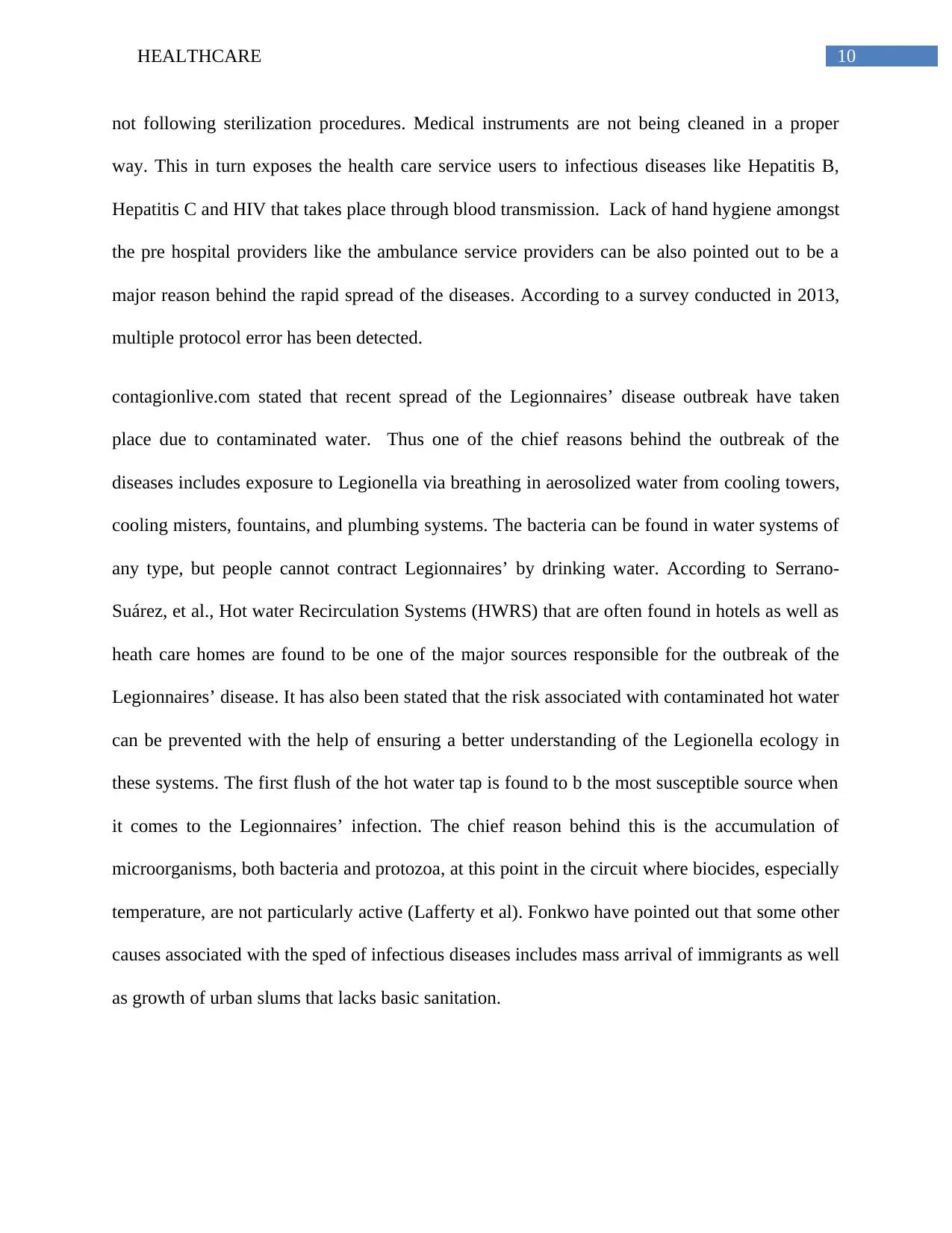
10HEALTHCARE
not following sterilization procedures. Medical instruments are not being cleaned in a proper
way. This in turn exposes the health care service users to infectious diseases like Hepatitis B,
Hepatitis C and HIV that takes place through blood transmission. Lack of hand hygiene amongst
the pre hospital providers like the ambulance service providers can be also pointed out to be a
major reason behind the rapid spread of the diseases. According to a survey conducted in 2013,
multiple protocol error has been detected.
contagionlive.com stated that recent spread of the Legionnaires’ disease outbreak have taken
place due to contaminated water. Thus one of the chief reasons behind the outbreak of the
diseases includes exposure to Legionella via breathing in aerosolized water from cooling towers,
cooling misters, fountains, and plumbing systems. The bacteria can be found in water systems of
any type, but people cannot contract Legionnaires’ by drinking water. According to Serrano-
Suárez, et al., Hot water Recirculation Systems (HWRS) that are often found in hotels as well as
heath care homes are found to be one of the major sources responsible for the outbreak of the
Legionnaires’ disease. It has also been stated that the risk associated with contaminated hot water
can be prevented with the help of ensuring a better understanding of the Legionella ecology in
these systems. The first flush of the hot water tap is found to b the most susceptible source when
it comes to the Legionnaires’ infection. The chief reason behind this is the accumulation of
microorganisms, both bacteria and protozoa, at this point in the circuit where biocides, especially
temperature, are not particularly active (Lafferty et al). Fonkwo have pointed out that some other
causes associated with the sped of infectious diseases includes mass arrival of immigrants as well
as growth of urban slums that lacks basic sanitation.
not following sterilization procedures. Medical instruments are not being cleaned in a proper
way. This in turn exposes the health care service users to infectious diseases like Hepatitis B,
Hepatitis C and HIV that takes place through blood transmission. Lack of hand hygiene amongst
the pre hospital providers like the ambulance service providers can be also pointed out to be a
major reason behind the rapid spread of the diseases. According to a survey conducted in 2013,
multiple protocol error has been detected.
contagionlive.com stated that recent spread of the Legionnaires’ disease outbreak have taken
place due to contaminated water. Thus one of the chief reasons behind the outbreak of the
diseases includes exposure to Legionella via breathing in aerosolized water from cooling towers,
cooling misters, fountains, and plumbing systems. The bacteria can be found in water systems of
any type, but people cannot contract Legionnaires’ by drinking water. According to Serrano-
Suárez, et al., Hot water Recirculation Systems (HWRS) that are often found in hotels as well as
heath care homes are found to be one of the major sources responsible for the outbreak of the
Legionnaires’ disease. It has also been stated that the risk associated with contaminated hot water
can be prevented with the help of ensuring a better understanding of the Legionella ecology in
these systems. The first flush of the hot water tap is found to b the most susceptible source when
it comes to the Legionnaires’ infection. The chief reason behind this is the accumulation of
microorganisms, both bacteria and protozoa, at this point in the circuit where biocides, especially
temperature, are not particularly active (Lafferty et al). Fonkwo have pointed out that some other
causes associated with the sped of infectious diseases includes mass arrival of immigrants as well
as growth of urban slums that lacks basic sanitation.
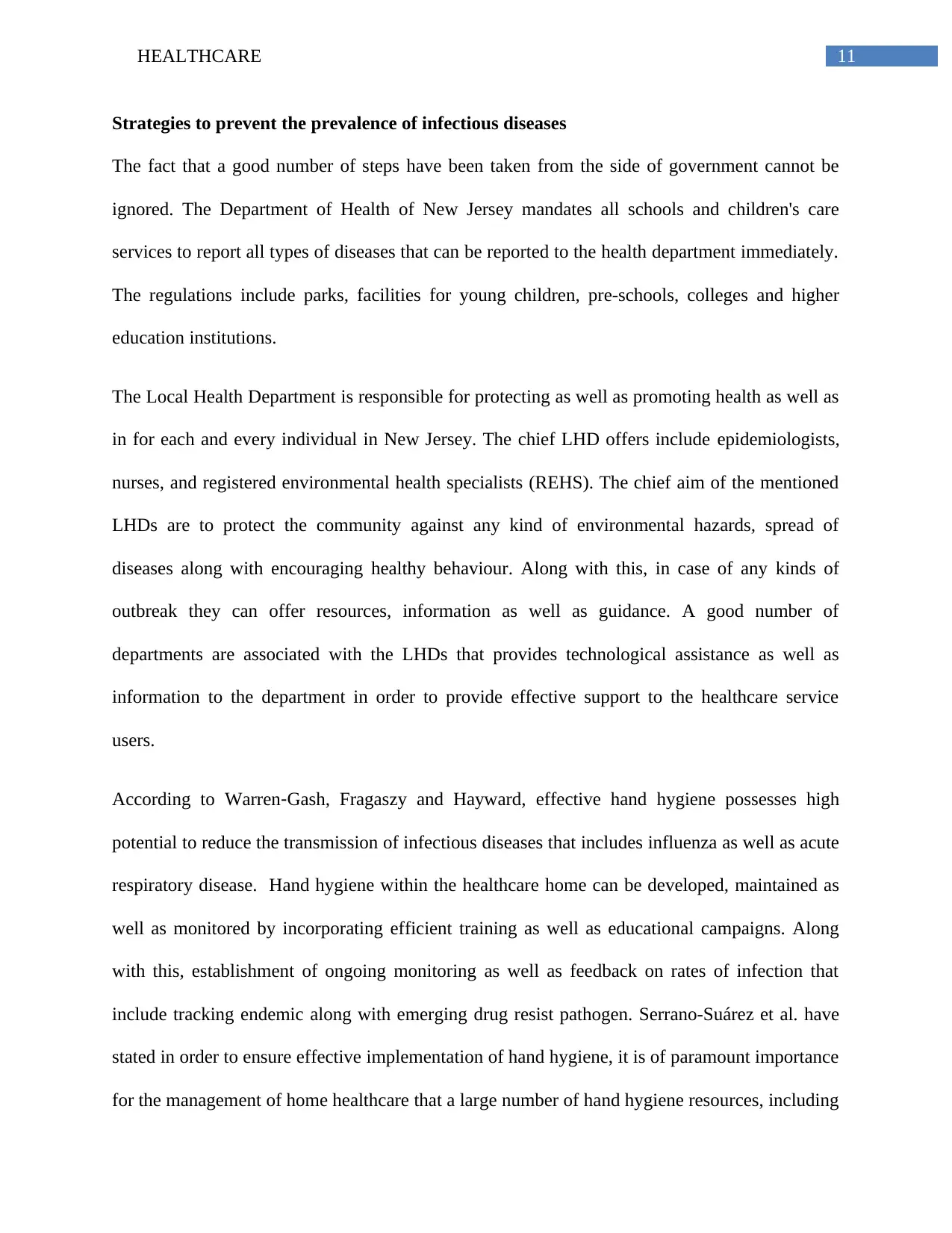
11HEALTHCARE
Strategies to prevent the prevalence of infectious diseases
The fact that a good number of steps have been taken from the side of government cannot be
ignored. The Department of Health of New Jersey mandates all schools and children's care
services to report all types of diseases that can be reported to the health department immediately.
The regulations include parks, facilities for young children, pre-schools, colleges and higher
education institutions.
The Local Health Department is responsible for protecting as well as promoting health as well as
in for each and every individual in New Jersey. The chief LHD offers include epidemiologists,
nurses, and registered environmental health specialists (REHS). The chief aim of the mentioned
LHDs are to protect the community against any kind of environmental hazards, spread of
diseases along with encouraging healthy behaviour. Along with this, in case of any kinds of
outbreak they can offer resources, information as well as guidance. A good number of
departments are associated with the LHDs that provides technological assistance as well as
information to the department in order to provide effective support to the healthcare service
users.
According to Warren‐Gash, Fragaszy and Hayward, effective hand hygiene possesses high
potential to reduce the transmission of infectious diseases that includes influenza as well as acute
respiratory disease. Hand hygiene within the healthcare home can be developed, maintained as
well as monitored by incorporating efficient training as well as educational campaigns. Along
with this, establishment of ongoing monitoring as well as feedback on rates of infection that
include tracking endemic along with emerging drug resist pathogen. Serrano-Suárez et al. have
stated in order to ensure effective implementation of hand hygiene, it is of paramount importance
for the management of home healthcare that a large number of hand hygiene resources, including
Strategies to prevent the prevalence of infectious diseases
The fact that a good number of steps have been taken from the side of government cannot be
ignored. The Department of Health of New Jersey mandates all schools and children's care
services to report all types of diseases that can be reported to the health department immediately.
The regulations include parks, facilities for young children, pre-schools, colleges and higher
education institutions.
The Local Health Department is responsible for protecting as well as promoting health as well as
in for each and every individual in New Jersey. The chief LHD offers include epidemiologists,
nurses, and registered environmental health specialists (REHS). The chief aim of the mentioned
LHDs are to protect the community against any kind of environmental hazards, spread of
diseases along with encouraging healthy behaviour. Along with this, in case of any kinds of
outbreak they can offer resources, information as well as guidance. A good number of
departments are associated with the LHDs that provides technological assistance as well as
information to the department in order to provide effective support to the healthcare service
users.
According to Warren‐Gash, Fragaszy and Hayward, effective hand hygiene possesses high
potential to reduce the transmission of infectious diseases that includes influenza as well as acute
respiratory disease. Hand hygiene within the healthcare home can be developed, maintained as
well as monitored by incorporating efficient training as well as educational campaigns. Along
with this, establishment of ongoing monitoring as well as feedback on rates of infection that
include tracking endemic along with emerging drug resist pathogen. Serrano-Suárez et al. have
stated in order to ensure effective implementation of hand hygiene, it is of paramount importance
for the management of home healthcare that a large number of hand hygiene resources, including
⊘ This is a preview!⊘
Do you want full access?
Subscribe today to unlock all pages.

Trusted by 1+ million students worldwide
1 out of 45
Related Documents
Your All-in-One AI-Powered Toolkit for Academic Success.
+13062052269
info@desklib.com
Available 24*7 on WhatsApp / Email
![[object Object]](/_next/static/media/star-bottom.7253800d.svg)
Unlock your academic potential
Copyright © 2020–2026 A2Z Services. All Rights Reserved. Developed and managed by ZUCOL.





